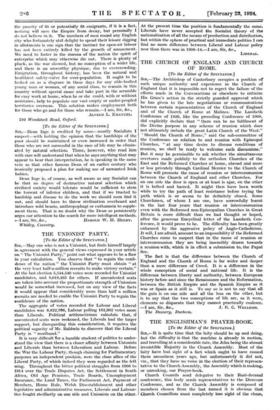THE CHURCH OF ENGLAND AND CHURCH OF ROME.
[To the Editor of the SPECTATOR.] SIR,—The Archbishop of Canterbury occupies a position of such unique authority and experience in the Church of England that it is impossible not to regret the failure of the efforts made in the Convocations or elsewhere to criticize His Grace's action in the strictly guarded approval which he has given to the late negotiations or communications between certain representatives of the Church of England and of the Church of Rome at Malines. The Lambeth Conference of 1920, like the preceding Conference of 1908, did explicitly declare that " there can be no fulfilment of the Divine purpose in any scheme of reunion which does not ultimately include the great Latin Church of the West." ' Should the Church of Rome," said the sub-committee of the Conference on relation to and reunion with Episcopal Churches, " at any • time desire to discuss conditions of reunion, we shall be ready to welcome such discussions." But it may be permissible to ask whether the simultaneous overtures made publicly to the orthodox Churches of the East and the Reformed Churches at home, abroad and more or less privately through Cardinal Mercier to the Church of Rome will promote the cause of reunion or intereommunion between the Church of England and other Churches. For on one side the door is open or at least is ajar, on the other it is bolted and barred. It might then have been worth while to try the path of least resistance before trying the path which is or seems to be definitely dosed. Some Churchmen, of whom I am one, have sorrowfully learnt in the last four years that reunion or intereommunion even with the Reformed non-Episcopalian Churches in Great Britain is more difficult than we had thought or hoped, after the generous Encyclical letter of the Lambeth Con- ference, it would prove to be. The difficulty has been greatly enhanced by the aggressive policy of Anglo-Catholicism. It will, I am afraid, amount to an impossibility if the Reformed Churches come to suspect that in the name of reunion or intereommunion they are being insensibly drawn towards a reunion with, which is in effect a submission to, the Papal See.
The fact is that the difference between the Church of England and the Church of Rome is far wider and deeper than a mere difference of Creed. It is a difference in the whole conception of social and national life. It is the difference between liberty and authority, between European history before and since the Renaissance and the Reformation, between the British Empire and the Spanish Empire as it was or Spain as it still is. To say so is not to say that all the gain is on one side and all the loss on the other, but is to say that the two conceptions of life are, as it were, elements so disparate that they cannot practically coalesce.










































 Previous page
Previous page